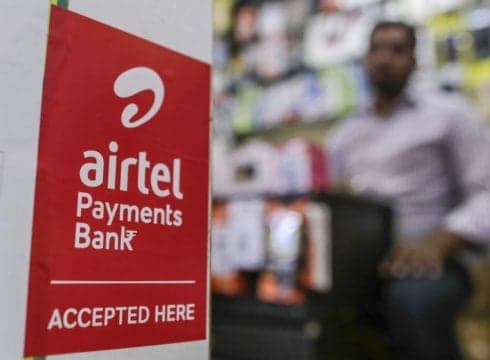With The New Feature, Customers Will Be Able To Link Their Bank Accounts On BHIM App
Inc42 Daily Brief
Stay Ahead With Daily News & Analysis on India’s Tech & Startup Economy
Less than 10 months after making its debut, Airtel Payments Bank has bolstered its digital platform with the integration of UPI (i.e. United Payments Interface). The move is aimed at enhancing customer convenience, while also ensuring secure digital payments.
Through this new feature, customers will now be able to connect their Airtel Payments Bank accounts to the BHIM app, which will, in turn, allow them to make payments via UPI. Furthermore, users will not be required to furnish their bank details for any UPI-based transfers.
Commenting on the development, Airtel Payments Bank MD and CEO Shashi Arora said, “We are pleased to announce UPI integration with Airtel Payments Bank. This would allow all our 20 million bank customers to create their personalised UPI handles on the Airtel app, and enable them to make digital payments in both the offline and the online space.”
The new feature, according to Arora, will be especially beneficial for offline and online merchants across the country. As per reports, Airtel Payments Bank customers will also be able to use the banking section of the MyAirtel app to scan UPI QR codes while making merchant payments.
Henceforth, merchants on the platform can choose Airtel Payments Bank as a payment mode for faster, safer, and more convenient transactions. Speaking about the UPI integration, National Payments Corporation of India (NPCI) COO Dilip Asbe stated, “Payments banks are capable of facilitating remittances and payments to a large user base especially to underserved area as per RBI’s vision. We are happy to on-board Airtel Payments Bank on BHIM/UPI platform.”
Airtel Payments Bank: Leveraging 260 Mn Customers Of Telecom Parent Airtel
Beating Paytm to the punch, Airtel launched India’s first payments bank in Rajasthan in November last year. This came after the telecom company was granted the payments bank license by the RBI in April 2016. After successful completion of its pilot phase, Airtel Payments Bank commenced nationwide operations in January 2017. At the time, the parent company reportedly made an initial investment of $440 Mn (INR 3000 Cr) to develop a pan-India banking network and digital payments ecosystem.
This was around the same time that India Post opened its payments bank in Ranchi and Raipur. The bank’s interest rates range between 4.5% and 5.5% on deposits up to $775-$1.5K( INR 50K-INR 1 Lakh).
At the time, the company also launched the Airtel Payments Bank app and an online card in collaboration with MasterCard for convenient banking and cashless payments. Available for Android and iOS, the app can be accessed through MyAirtel app. Airtel Bank’s product portfolio includes payment banking services and semi-closed mobile wallet services (Airtel Money).
Airtel Bank currently boasts a network of 250,000 banking points (Airtel retail stores) across 29 states. This is more than the total number of ATMs in the country. It currently offers the highest interest rate of 7.25 % p.a. on deposits in savings accounts. It is also working to develop a nation-wide digital payments ecosystem with over five million merchants. During the pilot phase alone, the bank reportedly onboarded over 1 Mn customers.
Airtel, Paytm, Fino Payments Banks Fighting For The Crown
Poised to reach $500 Bn by 2020 according to a report by Google and Boston Consulting Group, the digital payments segment in India has witnessed a sea change in recent times. As per the report, cashless transactions in the consumer payments segment is expected to double to 40% in the next three years.
Already 81% of existing digital payment users prefer paying online to any other non-cash payment methods. Indian consumers are 90% as likely to use digital payments for both online as well as offline transactions.
In May 2017, Paytm Payments Bank was formally launched as a mobile-first bank with zero charges on all online transactions and no minimum balance requirement. This came just a few months after the ecommerce and payments platform received the RBI’s final nod. At the time of its launch in May 2017, the payments bank received an initial investment of $34.2 Mn (INR 220 Cr), with Sharma emerging as its majority shareholder.
In the first week of June, payments bank licensee Fino Paytech received approval from RBI, for a nine-member-board of Fino Payments Bank. It received the final nod from RBI on March 31, 2017, to start the payments bank. As per an official statement, the company claims to have 28 Mn active banking customers spread across urban and rural areas. It provides a range of financial services including savings, remittance, insurance, credit etc.
Around the same time, it was reported that Aditya Birla Group was planning to launch its payments bank through the newly formed Aditya Birla Financial Services. Sushil Agarwal, Whole-Time Director and Group CFO, Grasim Industries confirmed the development, given the fact that Idea recently merged with Vodafone, one of the entities will eventually surrender its license post-merger and tie-up ABFS.
Most recently, Paytm Payments Bank raised $9.3 Mn (INR 60 Cr) from One97 Communications founder Vijay Shekhar Sharma and other existing investors. The development followed just over a week after the firm announced its own debit card.
Other entities that have also received RBI licenses include Cholamandalam Distribution Services Ltd, Tech Mahindra Ltd, Dilip Sanghvi (founder of Sun Pharmaceuticals Ltd), Reliance Industries, and National Securities Depository Limited. By integrating UPI on its platform, Airtel Payments Bank is likely looking to take digital banking services to India’s 420 Mn Internet users.
(The development was reported by ET)
{{#name}}{{name}}{{/name}}{{^name}}-{{/name}}
{{#description}}{{description}}...{{/description}}{{^description}}-{{/description}}
Note: We at Inc42 take our ethics very seriously. More information about it can be found here.


